#owl house meta
Text
Forgiveness and kindness in the finale of Owl House
One of the things I loved about the finale was showing that forgiveness and kindness are good things, that they can change people for better and that keeping an open hand for somebody to grab on is a beautiful and sometimes very healing thing. That it can change so much to just keep an open heart and try giving people another chance. Try forgiving them.
Like Luz and Eda and King did with Collector. They choose to be kind to them, to reach out and to try showing them a better way even when they didn’t need to. When they had every reason to be mad at him. And it changed everything for the Collector, who was hurt so much by everybody in their life, who didn’t understand the reality of his actions. It made all the difference in the world for him that somebody was willing to listen. To try forgiving and offering kindness even thought they did so much damage to everyone.
But.
They also showed the reality of it. That sometimes it just doesn’t work. Sometimes the person that we turn our kindness and our forgiveness towards isn’t willing to accept it and isn’t willing to work to better themselves. Isn’t willing to look at themselves and realize that what they’re doing is wrong. That they made a mistake. That they hurt others. They aren’t willing to work towards the better future.
Just like Belos.
Belos who refused to change. Belos, who looked at the kid he used and discarded, who was now offering him a hand in forgiveness, offering him kindness he was just taught to give and decided to not give a fuck about it. Who decided to take that kindness and destroy it. Belos, who to the bitter end was unwilling to look at himself and see what sort of person, what sort of monster he became. Belos, who refused the hand reaching out to him again and again.
And thats the beautiful and painful reality of forgiveness and kindness. It doesn’t work every time. Sometimes it backfires, like it did when Collector offered it to Belos. Sometimes it gets you or people you care about hurt. Like it did with Luz. And for it to work the person on the receiving end has to be willing to accept it. To work towards the betterment, towards being a better person, towards not making the same mistakes.
Sometimes when you give a chance to people, they will disappoint you. They will take your kindness and throw it back at your face. But does this mean we shouldn’t offer second chances to people? Does it mean that we shouldn’t forgive or be kind?
No.
Because there is always a chance that it can save people, just like it did with Collector, just like it did with so many characters in the series like Amity, Lilith or even Hunter. Because there is just as many people who will take the hand you offered and it will mean the world to them. It will change everything for them.
And I think thats beautiful.
#owl house#the owl house#owl house spoilers#toh belos#toh collector#the collector#owl house collector#owl house the collector#owl house belos#the owl house belos#owl house meta#i think?#toh#toh meta#the owl house meta#the owl house spoilers#toh spoilers#this turned out longer that i though it would jcnefkcn'#but I'm very proud of it!!#gin posts owl house
2K notes
·
View notes
Text
Kikimora - Owl House Wildcard
After watching the season finale a few times, there’s one story thread I don’t see being talked about much: Kikimora.
First, she’s instrumental in leading King to the Collector. Yay for spite!

But most importantly is present when the Collector is released.
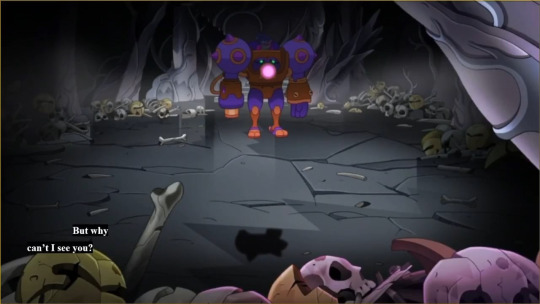
Kiki was in the perfect position to realize King’s collar/amulet will hide someone from the Collectors sight. And, as we never see King pick up the collar again, it may no longer be in his possession but in Kikimoras :shudders:
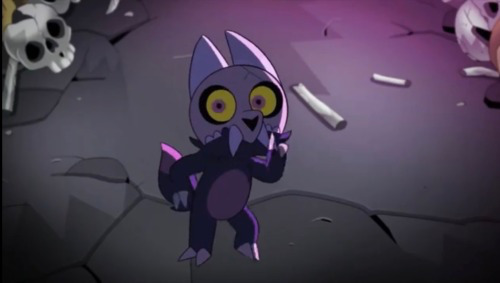
With her flying abomination and the ability to evade the Collector with King’s collar escaping Belos’ lab would be easy.
And she is definitely connected and ambitious enough to seize this opportunity for power. Especially if the coven heads are shaken and fighting each other. After all, the guards are used to seeing her as an authority figure; even demoted Kiki would be a familiar voice in the confusion.
TLDR - In the wake of the Collectors chaos and the power vacuum left by Belos, Kikimora may be in the best position to take over. Especially if she has King’s collar (maybe) in her possession.
#the owl house spoilers#the owl house#toh spoilers#toh kikimora#toh king#meta#speculation#wild mass guessing#king’s tide#owl house meta
235 notes
·
View notes
Text
Some Owl House/Hartford witch trial thoughts
This is something I meant to post much earlier but this is the last day before I (probably) turn out to be wrong, so I’m going to share some thoughts based on my going down a rabbit hole of reading about the Connecticut witch trials.
I thought it was interesting that I’d never heard much about the Hartford trials specifically, so I was curious if anything seemed potentially relevant in terms of connection to the TOH plot.
What stood out was that they were the first witch trials in the American Colonies, but it was also the first place to end/outlaw them--and, apparently, less on the basis that magic was fake and more on the basis that magic was actually fine sometimes. I found this book on John Winthrop Jr, the first CT governor and, apparently, the person mostly responsible for the said ending of witch trials.
Long story short, I sort of wonder if any of this relates to Caleb Wittebane.
I’m going to start with the timeline strangeness that lot of people have already pointed out.

In the portraits, we see the brothers meeting a witch as kids, but we know there are records of them in Gravesfield as adults, including with a Cardinal. So the idea that they were witch-hunters, went to the boiling isles the first time they were 'lured' by an actual witch, and never came back doesn't seem to scan.
Either they met her significantly before going to the Isles at all, or there was travel back and forth, at least on Caleb's part. One way or another, if that is Flapjack, Caleb had learned enough magic to have (make?) a palismen before being permanently gone from the human realm. In which case, I have to wonder if he tried to speak out against witch-hunting in Gravesfield.
So to circle back - I'm putting some super interesting quotes from that book on John Winthrop Jr. under the cut at the end, but tl;dr
He was the son of the founding governor of Massachusetts and he went abroad to study alchemy, folk magic, and occult medicine before getting involved in the witch trials--initially getting accused 'witches' acquitted and, in the long run, both becoming CT governor and stopping the practice of witch trials there.
Which makes me wonder if there might be some intentional parallels in Caleb, implied to be from some sort of important family, learning magic in the Isles and coming back to make the case that magic is fine, actually. And if he did sway the town against witch-hunting (at least until the trip that the brothers didn't come back from), how that played into the ultimate rivalry with Philip.
I'm sure it's not to the point of being based directly on a historical figure, but I think as a general idea it might relate.
Anyway - quotes below the cut, and whether or not this is actually anything I highly recommend the book as a really interesting bit of history.
Governor of Connecticut and son of the founding governor
of Massachusetts, Winthrop was one of the most important men in colonial English America. Born in 1606, he was a political leader from his arrival in New England in 1631 until his death in 1676. He was also a leading undertaker of three new towns and the promoter of New England’s first ironworks. Winthrop was a cosmopolitan intellectual and world traveler who journeyed through Europe and to the Middle East searching for knowledge of scientific mysteries. (p13)
In his early twenties he began to study alchemy, the branch of natural philosophy many believed was the key to all understanding. (p14)
Although Connecticut was initially New England’s most aggressive prosecutor of witches, it subsequently dramatically reversed its attitudes toward witchcraft prosecution. From the end of the Hartford witch-hunt forward, Connecticut set the standard for moderation in witchcraft proceedings, eliminating executions permanently and witch trials themselves for more than two decades.
Puritan magistrates’ growing reluctance to prosecute and convict witches has frequently been attributed to two factors: ministerial insistence on obtaining proof that a suspected witch had made a compact with the devil, and increasing skepticism about witchcraft itself engendered by the scientific revolution. In Connecticut, the transformation was too sudden and dramatic—and took place much
too early—to be explained by such factors. Before 1663, Connecticut ministers were aggressive witch-hunters, often instrumental in securing the evidence of the diabolical complicity they required for conviction. Furthermore, Connecticut’s change in attitudes occurred decades before Enlightenment skepticism began to exert meaningful influence on New England culture. Rather ironically, cessation of witchcraft prosecutions in Connecticut occurred through the agency of occult practitioners who assumed leadership at the highest levels of colonial society. (p373)
Analyzing how Connecticut was transformed so rapidly from the colony most likely to execute witches to a colony without witchcraft trials highlights the prominence in colonial society of a group of occult philosophers, Puritan ministers and magistrates, who pursued knowledge of the unseen forces at work in the natural world through the study of alchemy, alchemical medicine, and natural magic. Led
by Connecticut Governor John Winthrop, Jr., and the alchemist-minister Gershom Bulkeley, these magi-among-the-elect possessed both specialized knowledge of magic and the political authority to play a decisive role in reversing elite attitudes toward witchcraft prosecution. Their leniency toward witchcraft suspects was based, not on skepticism regarding magic’s efficacy, but, rather, on their intellectual understanding of the magical arts witches were accused of practicing. It is to Winthrop and his understanding of the role of occult forces in the operations of nature, not to the arrival of modern scientific thinking, that Connecticut’s sudden and sustained reluctance to prosecute witches must be attributed. (p374)
Winthrop believed magic was such a complex and powerful array of forces that the use of diabolical magic by ordinary people was both overstated and overfeared, and his opinions carried extraordinary weight. As a consultant on witchcraft cases in New Haven prior to becoming Connecticut’s governor and then as chief magistrate in Connecticut witchcraft trials, Winthrop consistently refused to endorse witchcraft charges, resisting both popular and ministerial pressure to convict witch suspects. He not only orchestrated acquittals in witchcraft cases; on at least two occasions he flatly refused to enforce convictions, ultimately overturning the guilty verdicts.
[...]
The conflict came to a head in the popular revolt surrounding the 1669 witchcraft case of Katherine Harrison, in which Winthrop, in careful coordination with the alchemist and minister Gershom Bulkeley, simultaneously undermined the legal foundations for convicting witches in Connecticut and removed intellectual study of the occult from ministerial suspicion and official scrutiny. Their ac- tions set precedents that influenced witch prosecution in New England for more than two decades. When historians examine the changing attitudes of the elite to- ward witchcraft prosecution in New England during the second half of the seventeenth century, they must include the actions of these students of the occult who themselves were members of the Puritan elite. (p376)
#toh#the owl house#toh theories#owl house theories#caleb wittebane#philip wittebane#wittebane brothers#toh caleb#gravesfield#toh meta#owl house meta#history#connecticut witch trials
60 notes
·
View notes
Text
The Owl House and “Protection”
I really love the nuanced narrative that toh has around protecting people. Sometimes it really is in their best interest (think Amity saving Luz from the new abomination/automation in Escaping Expulsion) but more often “protecting” someone is really about an issue within the protector and not about the protected. There’s much more examples of this. Think of Lilith largely complying with the capture of Eda because she thought he would cure her curse. Think of Gwendolyn spending a fortune on alternative medicine in an attempt to fix things for her daughter. Think of Amity trying to protect Willow and Willow having to push back and make Amity understand that she is much more powerful than the Willow Amity knew as a kid. Think about Eda trying to protect Raine from the truth about her curse, which is what ultimately ended their relationship. Think about Raine making the same mistake, trying to keep Eda out of the Day of Unity plans in attempt to protect her, while actually causing her to take more risks and making her think that she was helpless against Belos. Think about Luz trying to shield Amity from her grief and only putting a wedge between them. Think about Amity’s parents trying to keep her safe and how it makes her feel stifled. Over and over again toh champions trust, respect, and self efficacy. In the end of O Titan Where Art Thou Eda clearly sees herself in Luz when Raine says that Eda wouldn’t “stop until [she] made things right” this is a culmination, a statement of a moral that people will do what they are good at, what they are passionate about, and as loved ones it is not our role to protect them from risks they incur while doing so but rather to support them and to trust them to do things themselves. While I feel that toh is much more than just a kid’s TV show, it still is a kids show and I think it is so great that toh is teaching kids to trust themselves, and to respectfully put up boundaries with their peers in and parents in order to do things themselves. Obviously members of the cast are willing to help each other, but after someone has demonstrated that they need help, rather than starting with that assumption. (On a side note, that is what is taught in basic mental health crisis management, to ask people what they need, to listen to them, rather than to protect them from harsh realities or “fix” things for them so I think this is a really important lesson to learn.)
#toh#the owl house#owl house spoilers#the owl house season 2#owl house meta#I guess?#or just ramblings#I really like this show ok
27 notes
·
View notes
Text
Ok. I've had a few requests about what I said about Eda and Luz and Luz not calling Eda Mom. I'm... going to try to put it in words, but it's something hard to nail down.
But let me be clear about one thing.
They are family. Eda and Luz and everyone else are Family.
More under the cut...if the Readmore works on mobile today.
:Readmore:
So. Family!
We know King views Eda as his mom and Luz as his sister.
We know Eda sees them both as her kids.
We know Luz considers King her brother and Lilith her Aunt.
So. We know that means Luz probably considers Eda as a mom.
But she won't/can't say it.
Because her blood mom in the Human Realm is still alive.
And Luz already feels guilty about leaving her Mom alone, especially after seeing her with Vee.
With the perfect daughter that her Mom likes more.
But she's trying to find a way back, because she saw how bad her Mom was hurting once she realized Luz went to another realm to...not get away from her Mom, but the expectations of what her Mom wants from her.
The expectations Luz can't live up to, because they're for Luz to not be Luz anymore
And it hurt Luz to see her Mom hurt by Luz choosing a place she's happy at, hurt enough to promise that she'll get to the human realm and be miserable stay with her Mom.
Luz calling Eda Mom would add one more nail into the coffin, so to speak.
Not because she doesn't view her as a Mom, but because that would completely shatter Camilla if she ever finds out.
23 notes
·
View notes
Text
It always surprises me how expressive Hunter is, given the way he was raised. He was a soldier after all, a weapon, Belos' right hand man.
And then I remember that he used to wear a mask all the time. He wouldn't have had to control his expressions at all.
So without it? He really wears his feelings on his sleeve. Something that could have been easily exploited in the Emperor's Coven and probably was.
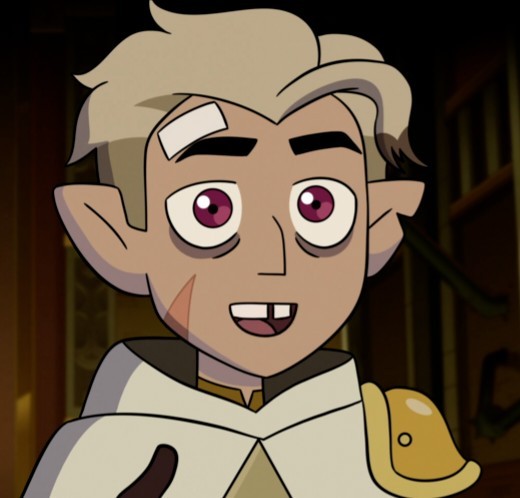
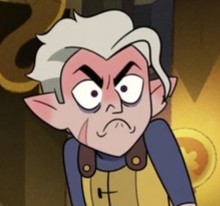
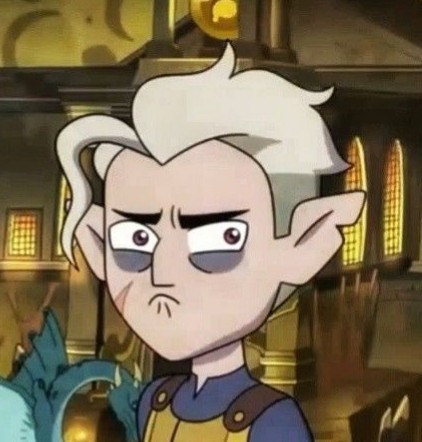
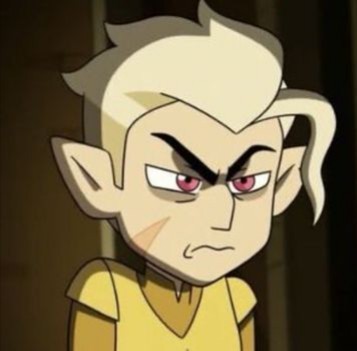
18K notes
·
View notes
Text
So I did some wiki surfing last night and discovered something:
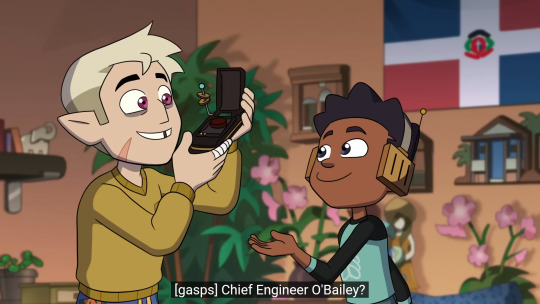
Basically....


Hunter’s Halloween costume is a lot more meta than we realized
#the owl crew knew EXACTLY what they were doing#the owl house#toh hunter#hunter the golden guard#hunter wittebane#it was already pretty meta but now it's even more so#gus porter#cosmic frontier
20K notes
·
View notes
Text


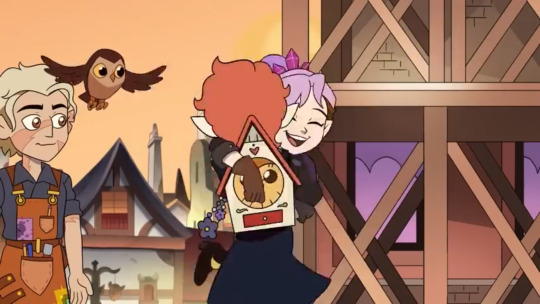
They really heard the “Lilith is Amity’s mom” fans and finally threw us a bone...
Dana’s been aware since 2020, so I really appreciate it;
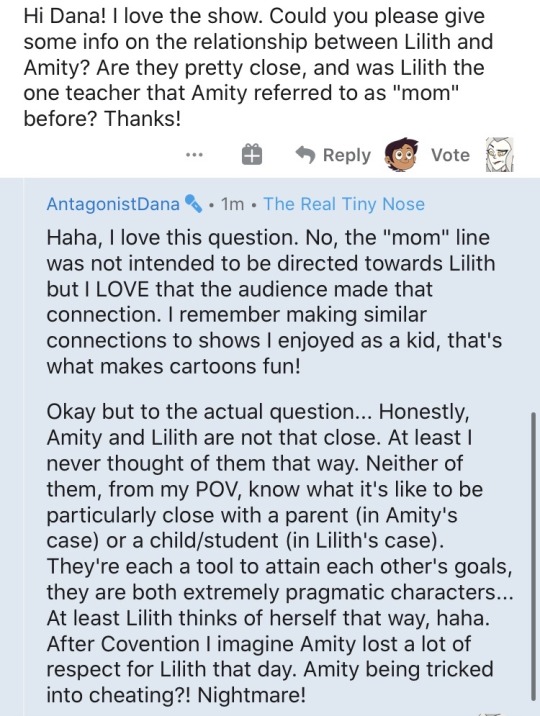
Given she also loved making connections in her shows as a kid, it feels like a nice acknowledge, reward, and appreciation for engaging with her work on a passionate level; Hence Any Sport in a Storm’s B-plot!
4K notes
·
View notes
Text
Endless things to say about these two...

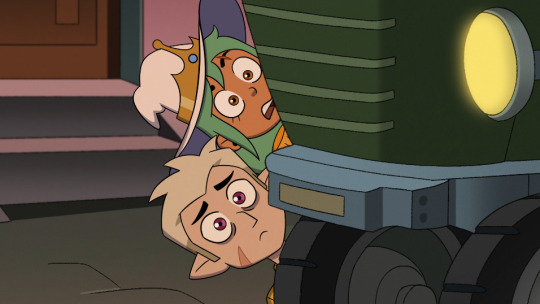

Luz means "light", while Hunter was named by Belos in accordance with witch hunters:
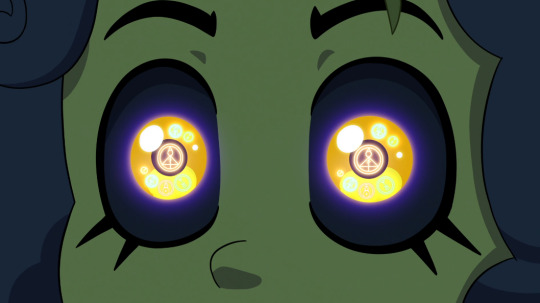
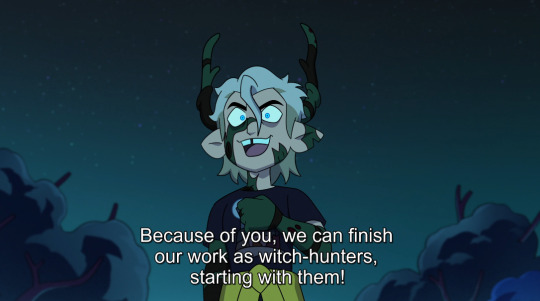
Their encounters with one another in Hunting Palismen and Hollow Mind would set future events in motion:
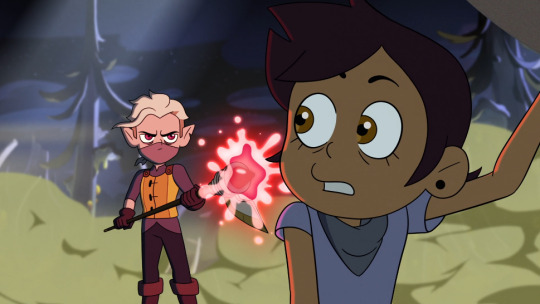
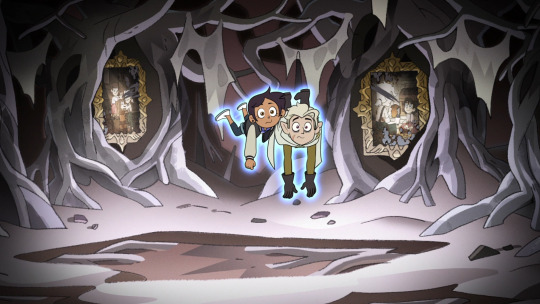
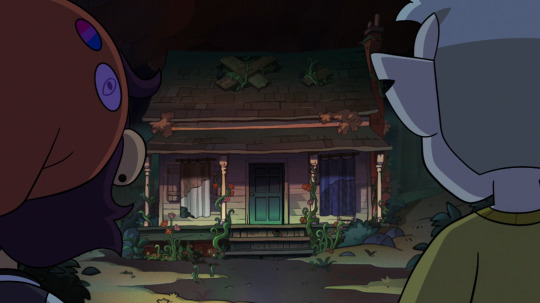
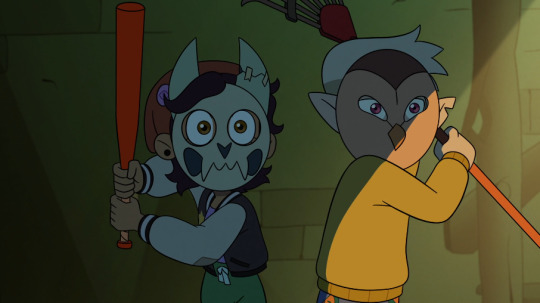
and also led up to Luz telling him "You're family now":

What happened in Thanks to Them reflects the Hollow Mind paintings shown below:
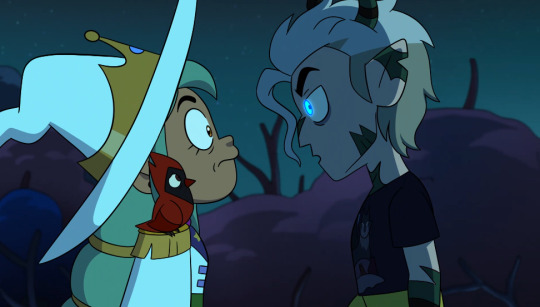


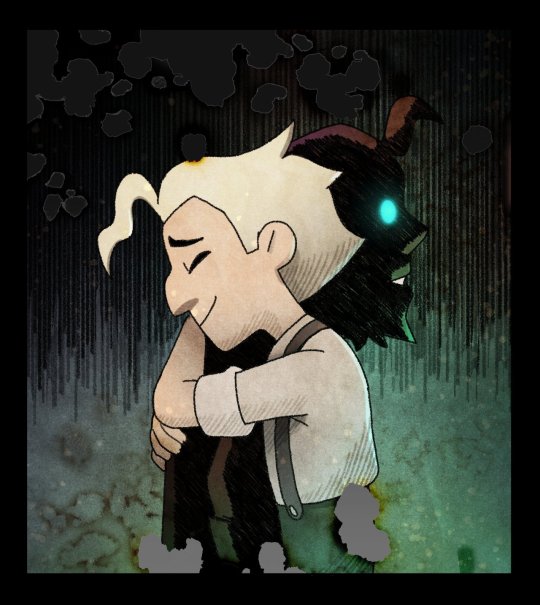
Belos took both of their lives, and we hear a contrast between Luz saying "I feel like I should be used to this by now, but...I still don't know what to say" and Hunter expressing the desires which he never dared to express in Belos's throne room, since the Titan had yet to pass the wisdom of choosing oneself to Luz:


They were pulled out of the water in which they were sinking, by the parent of their adoptive sibling (who also cared about them deeply):
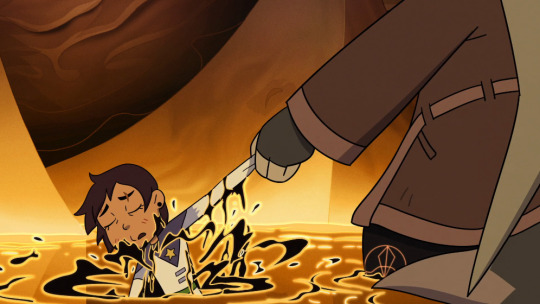
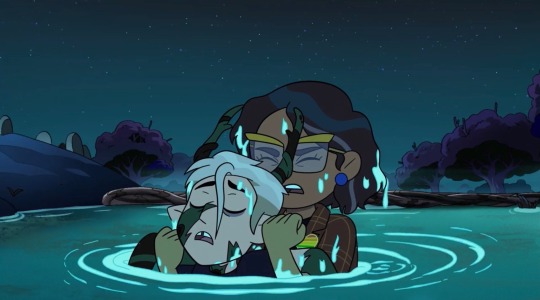
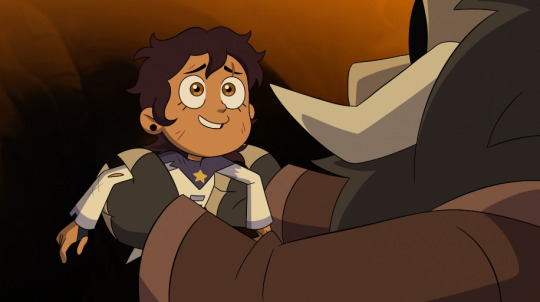

The loved ones who revived them, passed them the last of their strength in order for these kids to have new life:
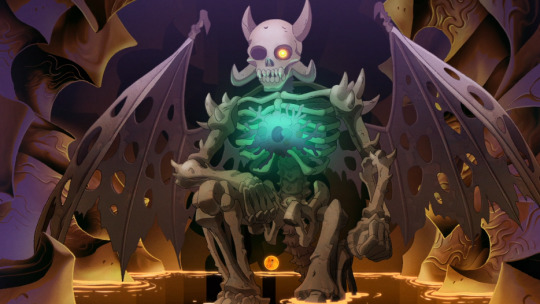

And King's dad asked Luz to choose whether she'd receive his life force which he offered, while Belos coercively violated Hunter to use his body like he would a puppet.
The things that Luz and Hunter went through, in parallel, underscore the clash between Belos who told endless lies about the Titan's will, and the Titan himself - King's father - who had very different plans for the Isles. Caught in between:

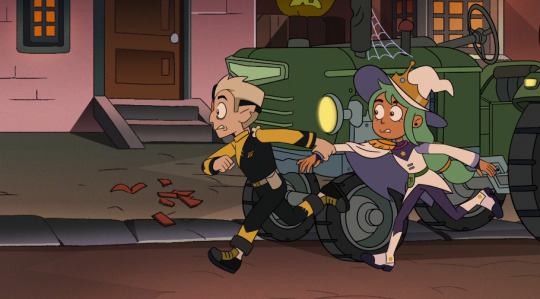
They were put through so much.

(The big comparison post I made before thinking of this analysis - it's just a picset and not a meta/analysis - is here: link)
#toh spoilers#luz noceda#toh hunter#the owl house#king's dad#camila noceda#toh flapjack#wittebane brothers#emperor belos#titan luz#possessed hunter#luz and hunter are siblings#toh analysis#loz writes a meta
3K notes
·
View notes
Text
There is a lot of craziness that’s been going on at The Boiling Isles. But at least we know now that King still had his mom through it all.
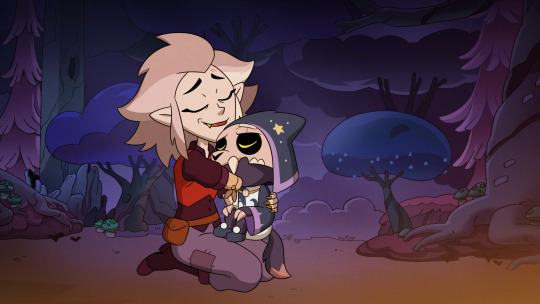
#the owl house#toh#toh spoilers#the owl house spoilers#eda clawthorne#mama eda#eda the owl mom#eda the owl lady#king clawthorne#for the future#season 3#s3#meta#toh meta#the owl house meta#my own meta
4K notes
·
View notes
Text
Alright, it’s less than a week since the Owl House finale aired and as expected I’ve already seen two direct comparisons to Steven Universe’s ending and several more vague-blogs, because one of this site’s hobbies is using other queer shows to put down Steven Universe. So let’s do this, then. Let’s compare the endings of Owl House and Steven Universe, and what each is ultimately trying to say.
Steven Universe and the Owl House are both shows that deal heavily with the clash of individualism and self-expression vs. socially-mandated conformity, and both shows’ final villains ultimately embody this conflict. One major difference, however, is that Owl House approaches this from the perspective of legal/societal structures, while Steven Universe approaches it from the perspective of family structures.
Steven Universe has always been about family--and particularly the ways traumas and biases are passed down through a family--and it has always heavily used the language of metaphor to discuss these topics. The Diamonds are the ultimate extension of this theme, something a lot of bad-faith (or just bad) takes on the ending miss; they interpret the diamonds in their literal capacity as dictators, rather than the way Steven Universe always portrays them, which is as matriarchs, i.e. the heads of a family who dictate and control all the family’s other members. This metaphor becomes more and more blatant until it outright becomes text, with the Diamonds turning out to be Steven’s literal family members, with whom his part of the family is estranged because of their previous controlling behavior.
In accordance with this theme, we ultimately find out that the Diamonds’ toxic ideology, with its rigid standards of perfection, are not only something they enforce on the gems below them, but also on themselves. They are suffering from the system in their own ways, unable to live up to the standards they themselves created. And who among us hasn’t known someone like that? A parent or grandparent who grew up under a cruel, oppressive worldview, and instead of rebelling against it internalized it--who turned around and said “I dealt with this, and so can you”? And so the ending of Steven Universe is the Diamonds realizing exactly how toxic the rigid ideology they’ve spent their lives perpetuating really is, and confronting the fact that their adherence to this ideology is what destroyed their relationship with Pink, and that the only way they’re going to have a relationship with Steven is if they’re willing to commit to changing both themselves, and the family structure they’ve enforced for so long.
Emperor Belos, in contrast, is not suffering from the structures he created, because his rules were never meant to apply to him. He sees the witches (and demons, and so-on) as lesser beings, evil beings, who exist to be controlled, and ultimately, exterminated. And every element of the society he built--the schools, the government, the police force, the religion--he intentionally constructed to keep these lesser beings under his control. The real-world allegory isn’t hard to see, here. And because what Belos represents in the story is, in fact, a fascist leader, the story shows that he can’t be reasoned with in any way that matters, and instead he is ultimately ground into paste beneath the boots of the people he sought to destroy. Different themes, different endings.
Now the usual argument that comes up here is as follows: but the Steven Universe ending isn’t as realistic! Not everyone is going to change, not everyone is going to be able to be reasoned with. Not every older, conservative family member is eventually going to accept you for who you are. And while that is true, ultimately SU isn’t meant to be realistic; it’s meant to be a power fantasy. Rebecca Sugar has come out and said before that they wrote a world in which there was good in everyone, because that’s the way she wishes the world could be. That’s the world they want to be able to believe in. And I am never going to begrudge a person, much less a queer person, for finding healing in writing that kind of world.
But you know what else is unrealistic? What else is ultimately just a fantasy? Grinding your government’s fascist leader into paste under your boot, then taking over and remaking society into something that accepts everyone. Sadly, Trump is not likely to get his ass beat any time soon. And more generally, punching fascists, while ideologically sound, is something most people are not going to get to do, due to real-world consequences such as “getting beat up by the fascist’s angry friends” and “being arrested for assault”. And even if you did depose one leader, our very society is set up in a way that perpetuates all manner of injustices, and systemic change is a complex and lengthy process that almost certainly won’t be completed in our lifetimes. But it’s fun to imagine we could, isn’t it?
Both endings are power fantasies. Both show the way they want the world to be, rather than the way it is. They are very different power fantasies, which fill very different--and at times conflicting--needs. And in situations like that, internet culture really likes to pick one to be the right fantasy, the right way to look at the world.
But the truth is, both fantasies are needed! Some people need stories about your queerphobic relatives finally realizing the error of their ways and taking the necessary steps to accept and reconcile with you. And some people need stories where you get to grind fascist bastards beneath the heel of your boot. It’s okay if you prefer one type of fantasy over the other! But in the end, both are valuable, and both are important.
And isn’t it wonderful, for us to have such a diversity of great queer stories? That we can explore both of these deep, conflicting needs? Let’s appreciate each of these fantastic works for what it was meant to be, rather than trying to pit them against each other or make them conform to a single, “best” way to tell a story.
#owl house#the owl house#toh#toh finale#toh spoilers#steven universe#sunset#su spoilers#meta#discourse#my meta#queer fiction
3K notes
·
View notes
Text
So I had this terrible thought.
Remember that scene in “Hollow Mind” where Collector was just like, “I’m starting to think you make those things just to destroy them.”?

Yeah. This one.
So.
Belos was only person Collector was in contact with since they were imprisoned. And we can safely assume that before his imprisonment, they only been in contact with titans and others of their own race, both of which are very long lived and very powerful.
And then he saw Belos create clones of his brother many, many, many times. Being killed over and over again and then being brought back over and over again.
Belos was the only person they’ve been in contact with.This was his only reference for death of beings on Boiling Isles.
Keeping that in mind.
Is it really so weird that Collector thought people can be repaired, just like toys? That he didn’t fully understand the concept of death?
#owl house spoilers#owl house#toh meta#collector toh#collector#the owl house#toh#toh spoilers#the owl house spoilers#owl house meta#the owl house meta#belos#emperor belos#belos toh#collector the owl house#collector owl house#the collector#the collector owl house#gin posts owl house
207 notes
·
View notes
Text
I’ve seen people talk about the main theme of the owl house being acceptance, and I think they’re completely right about that. But I haven’t really seen anyone look at the sub themes depicted in the show around the acceptance theme.
Specifically how the owl house is really advocating for child autonomy. Specifically in the ways of discipline, showing that communicating and talking with children ends up being a lot more beneficial and effective than punishing them.
The most obvious example comes with the collector, where instead of talking to him, King’s dad punished the kid by putting him in essentially time out, for the actions of his siblings. Which he would’ve learned if he had talked to the collector. And then following that, every interaction before talking with Luz, has the collector being used or placated in some way instead of being treated like an actual child due to the amount of power he has. The titan trappers revering him as some sort of god, Belos manipulating him, and even king attempting to appease the collector, instead of really talking to him. Though for king it’s a bit more understandable. Even so, the show showcases the collector’s change only after he’s talked to like a person, and then shown why his views were wrong.
Luz, who’s the main focus of the show, has her character arc and journey centered around being punished for her not fitting in at school. And while, yes, some of Luz’s antics that were shown seemed to be legitimately dangerous, the real solution would’ve been to talk with her and teach her about safety and why bringing wild animals and fireworks into a school building is dangerous. It should have also been that Luz should be able to talk and negotiate with her teacher about what would be acceptable for her projects with her endless creativity. The solution was not to essentially punish Luz for being creative, and what that only did was make her feel worse about herself and more isolated from the people she thought would be on her side. And then we were shown in thanks to them and for the future, Camilla’s growth into understanding that not talking to Luz about this, and essentially forcing her into normality, was not the way to go about things.
And we see this theme again, with Willow forced into the abomination track because her parent’s thought that was what was best for her, until she was able to showcase her skills and switch to what she was actually good at. Alador realizing he missed a lot of Amity’s growth by not talking to her, and then making it up to Amity by letting her set the boundaries and reestablishing their relationship. Odalia being controlling and not listening to her children which lead to actively harming their social development, until she was confronted and then shut out. Belos manipulating Hunter, isolating him, and abusing him, not even listening to what he had to say. And all of these situations were made better and more bearable when they were given the chance to take charge and be heard.
All this, in an attempt to showcase that children can be vulnerable and malleable, but they are also smart and understanding. And instead of deciding what a child needs, it’s important to communicate with the child instead, asking what they need and listening to what they’re saying. And implementing that by guiding and supporting them, not attempting to control them to what someone else thinks is right.
Children are smart and observant, they just need to be taught how to communicate, and viewed and thought of as actual human beings.
In a way, the owl house is attempting to advocate for it’s audience, and that’s beautiful.
#the owl house#toh#toh spoilers#toh season finale#luz nozeda#toh hunter#willow park#amity blight#child autonomy#honestly i think it's a really important thing to be taught to everyone at every age#Children are seen as dumb and it's disheartening because they're not#they're open to new ideas and possibilities and not yet stifled by their own learned w-orld veiw#and they don't know everything so that's why they need to be taught#refusing to teach them ultimately takes away any chance of growth#no kid is a lost cause#and kids can understand when something is wrong#ignoring them looses the chance for the kid to learn how to understand and indepen-dently come up with a solution later#toh meta
2K notes
·
View notes
Text
The Owl House And Restorative Justice
At the end of Season 1 of The Owl House, it is revealed that Lilith, the main overarching antagonist of that season, was the one to curse her sister Eda, one of the protagonists, to win a tournament when they were teenagers. This information causes Eda to fly into a screaming rage and attack Lilith, and understandably so.
Eda’s curse is essentially a chronic illness, one that, in Eda’s own words, has ruined her life, being the reason she’s considered a social outcast and why, before meeting King and Luz, she hadn’t gotten close to anyone in years. In season 2, it’s revealed that the curse is why she pushed away her partner Raine to the point that they broke it off with her, and that during a particularly bad flareup, she accidentally maimed her own father, leaving him half blind and with permanent nerve damage to his hands, making him unable to continue working as a Palisman carver. The curse has ruled Eda’s life for decades now, so to Eda, this is the ultimate betrayal.
In the first episode of Season 2, Lilith has defected from the Emperor’s Coven, split the curse between Eda and herself to mitigate the symptoms for her sister, and has moved in with Eda at the Owl House. While Lilith herself still feels guilty and feels she has to make it up to Eda, everyone else, Eda included, has seemingly either forgiven her or chosen to look past it. Eda even makes fun of her for feeling bad about cursing her, and Lilith’s guilt is seemingly absent for the rest of the series.
The response to this was… Less than stellar, shall we say. A lot of people were angry, saying Lilith got away with her crimes without even a slap on the wrist, and that Eda’s forgiveness of her was far too sudden.
This isn’t the first time we’ve seen this kind of critique. Amity spent years bullying Willow after her parents forced her to break off their friendship, and when she began trying to mend that relationship, the response from fans was that Willow should have been a lot more angry at Amity, and that they went back to being besties far too soon. I’ve even seen this criticism leveled at Hunter for the things he did while working for Belos, at Vee for impersonating Luz for months to trick her mother, and at Luz for hiding the fact that she helped Philip find the Collector from her friends. And it does seem strange for the show to keep tripping on this same point again and again.
Except, it’s not really. Because I think that, when viewing this show from a different angle, those supposed flaws are actually symptoms of something very important to understand – The Owl House operates on a system of crime and punishment that is very different from our world’s.
More specifically, our world mostly utilizes retributive justice. The world of The Owl House utilizes restorative justice.
So first, what do those terms mean? Broadly, they’re two different forms of handling interpersonal disputes, or dealing with crime.
Retributive justice is the one our current justice system uses, where the focus is primarily on punishing the perpetrator. Retributive justice can mean detention, suspension, expulsion, jail time, monetary fines, some kinds of community service, exile, or in more severe cases, corporal punishment or the death penalty. It’s the lens most people view the world through, where if someone hurts you, hurting them back is the correct response.
Restorative justice is a very different approach, where you instead focus on helping the victim recover from what happened, and rehabilitating the perpetrator to prevent this from happening again. Restorative justice can look like verbal or written apologies, monetary compensation for costs and trauma, therapy for both victim and perpetrator, education for the perpetrator, mediation between victim and perpetrator, a restraining order, etc.
When viewed through a retributive lens, The Owl House lets its characters get away with a lot of shit. Lilith cursing Eda, Hunter rounding up Palismen knowing they’ll be killed, Amity tormenting Willow for years, it’s all stuff that, in a retributive environment, they should be punished for, and they’re just not. Eda is only genuinely angry at Lilith for two scenes, Amity and Willow fix their relationship very quickly once Amity starts making amends, and Hunter isn’t punished at all.
However, I believe the story of The Owl House is best viewed not through a retributive lens, but through a restorative lens.
Let’s look at the Lilith-example again. Lilith’s offense was cursing Eda, which she did because she wanted to win a spot in the Emperor’s Coven. Knowing Eda was better than her, she cast a curse on her, thinking it would only last for a day. But when the time came, Eda forfeited the match, soon after which she transformed into the Owl Beast and was pelted with rocks until she ran. The curse turned out to be very permanent, and Lilith spent the next 20 years trying to fix her mistake by working for Belos to try to capture Eda, since he promised to heal her curse.
However, when she finally succeeded, Belos went back on his promise. Instead of healing Eda, he ordered her to be publicly executed. When Lilith protested, Belos essentially told her to shut up, that it was the Titan’s will, and left her there.
So, having realized her method of fixing her mistake has gone real bad, Lilith sneaks down to the Conformatorium to free Eda herself, but arrives too late and finds Luz instead. After a brief fight they end up teaming up, and Lilith leads Luz to the elevator, but they are captured by Belos and Lilith is thrown into the cage with Eda. There, she restores Eda’s partially petrified body, and after fleeing with her, Luz and King, uses a spell to split Eda’s curse evenly between their two bodies.
From a restorative justice point of view, Lilith has done pretty much everything she reasonably could do to fix things. She’s denounced the Emperor’s Coven, returned Owlbert to Luz, helped Luz find the elevator to the execution platform, saved Eda from petrification, apologized to Eda, and while there’s no way for her to cure Eda’s curse entirely, she took on half of the curse at great expense to her own health, in order to ease Eda’s symptoms.
Eda isn’t angry anymore because in her eyes, Lilith has already fixed things with her. Punishing her more at this point is pointless. What more could Lilith do, really? What other lessons could she learn? The only thing that punishment would bring at this point would be more suffering.
Let’s look at another example: Amity and Willow.
Amity’s offense was breaking off her friendship with Willow because she was a late-bloomer, bullying her for years, and allowing her friends to do so too. Willow is left with horrible self-esteem issues because of this, and combined with her failing grades, turned her into a horribly shy and withdrawn wallflower (no pun intended). After she’s moved to the plant track she starts actually getting better, but Amity and Boscha especially continue to torment her. While Amity’s bullying of Willow does peter out over time, Willow is clearly still extremely resentful of her. In an attempt to make Willow forget their friendship, Amity accidentally sets most of Willow’s memories on fire, leaving her confused, amnesiac, and unable to grasp basic concepts like that chairs are for sitting in.
Luz pushed Amity into fixing Willow’s brain by going into her mind together and piecing her memories back together. There, the Inner Willow revealed what happened to Luz and the audience.
At this point, Amity shows her that her parents were actually the ones who forced her to end the friendship because they didn’t think Willow was a suitably powerful or influential friend, threatening to make sure Willow would never get accepted into Hexside if Amity didn’t force her to leave. Amity then apologizes to Willow for going along with it, and for the bullying, and vows to make sure her friends never mess with Willow again.
Willow accepts her apology, but also makes it clear that, while it’s a start, she’s not yet ready to accept Amity in her life again. Restorative justice has not been fully attained, because to Willow, Amity hasn’t fixed everything – Boscha and her squad are still bullying her, and still consider Amity one of them. This changes two episodes later, when Amity tells Boscha to grow the fuck up when she starts bullying Willow again, and joins her and Luz’s Grudgby team despite her personal issues to get Boscha to back off. Willow doesn’t make a grand gesture of forgiveness in this episode, but it is after this point where the two become comfortable around eachother again.
Did Willow forgive Amity too quickly for years of trauma? Maybe. If she had chosen to continue keeping Amity at a distance I certainly wouldn’t have blamed her. But in the end, Amity fixed the mess she caused as best she could, and has proven herself to want to be a better person, to want to be Willow’s friend again. She worked hard to prove herself to be a person worth trusting, and Willow decided to give that trust a chance again.
And while they did become friends again, that friendship was clearly still affected by what happened, which led to bumps that the two of them had to work through. Like in Labyrinth Runners, where Amity’s overprotectiveness over Willow makes Willow feel like Amity thinks she’s incompetent, and still only sees her as the helpless person she used to be.
Willow continuing to be mad at Amity and punishing her for what she did wouldn’t be an unreasonable reaction, but it wouldn’t have fixed anything. It would certainly have an impact on Amity, seeing her former best friend rejecting her attempts to make up for what she did, but the hurt on both sides would have continued festering, because deep down, Willow missed Amity too.
In Hunter’s case, there’s the question of whether he can even be held responsible for his actions. The Palisman-kidnapping in specific was explicitly done under duress – if he failed he would face verbal and physical abuse, and be threatened with his nightmare scenario: getting thrown out of the Emperor’s Coven.
And that’s not an empty threat either. Hunter has no magic, and Belos has drilled it into him that witches without magic have no future. Without the Emperor’s Coven, his only future prospects would be starving to death on the streets or wasting away in prison. Either way, Hunter would be alone, without family or friends, without a job or job prospects, without anyone to turn to for help. Any child would be terrified of that. Hunter wasn’t always acting on direct orders – in fact he defied direct orders to stay in his room in Eclipse Lake to go look for Titan’s Blood, and then again in Hollow Mind to arrest the rebels. But he made those choices based on the idea that Belos wouldn’t want him if he was a failure, and that he needed a chance to prove that he could still be useful.
And contrary to popular belief, Hunter does know right from wrong. He has a very strong moral compass, he’s just been forced to ignore it in favor of doing whatever the Emperor wants. To shut up that little voice telling him he’s doing the wrong thing, he uses what’s called a thought-terminating cliche, a statement that feels so fundamentally true that the argument need not continue. In Hunter’s case, that statement is “It’s for the greater good.” Sure, kidnapping his new friends and abducting Palismen to feed to the Emperor and threatening someone who’s been nothing but kind to him to take the portal key from her girlfriend and justifying terrorism makes his stomach feel like he swallowed a cactus and saying it out loud makes him sound like a horrible person – but it’s for the greater good. He’s doing it to serve Belos, and Belos knows what’s best.
So by the time Hunter is out of active danger and able to rest and recover from what happened to him… what would further punishment accomplish? He already knows that he did fucked up shit while working for the EC, and he’s proven time and time again that while he’s not fighting for Belos’s approval, he’s actually a genuinely kind-hearted kid. Punishing him now would likely cause him to react very poorly, because he’s been at the wrong end of that stick so often that he’s developed severe PTSD because of it.
And if you think restorative justice is still in order – Hunter is currently hyperfixated on making sure Belos can never hurt anyone again, and for the long term, he has expressed that he wants to become a Palisman carver when he grows up. While it won’t bring back the Palismen that were killed, it will help the current Palisman population recover and reintroduce Palismen to witches who may have had to give up theirs.
When viewed through this lens, the writing of The Owl House starts to make more sense. As a show, it is extremely forgiving towards its characters – they’re still held accountable for their actions, but as long as they’re willing to grow and learn and fix the damage they caused, they are very quickly forgiven.
However, I do understand why these writing choices can be… controversial, so to say. Because it doesn’t feel very satisfying, does it? When someone hurts you on purpose, your first impulse would be to try to hurt them back, that’s just how people work.
That’s the hardest thing to come to terms with when you become an advocate for prison abolition for example – you’re not just arguing for freeing a guy who got 5 years because a cop found weed in his pockets, you’re arguing for the release, and most importantly, the humanity of some of the most vile, disgusting people this planet has ever produced. Even now, when someone commits a truly awful crime and gets sent to prison for life, my first thought is “Good, I hope they rot in there.” But that’s not justice. That’s just revenge. And revenge is not something we as a society should want to build our justice system on.
It’s not satisfying to see Lilith go from using Luz as a human shield in her fight against Eda to sleeping on the couch in Eda’s house within 2 episodes. It’s not satisfying to see Willow let Amity back into her life when Amity has hurt her so badly before, or to see Hunter become romantically involved with Willow after he literally abducted her the first time they met. But that satisfaction isn’t really the point. Revenge is satisfying in the moment, but an eye for an eye makes the whole world blind, and if someone shows a genuine willingness to change, it’s often better to give them a chance to.
However, my final point is about what happens when this approach fails. Because not everyone is willing to change. Some people, when faced with the consequences of their actions, decide to dig their heels in and refuse to admit fault, or blame the victim(s), or use those same thought-terminating cliches that Hunter used to justify their actions, “I was just following orders” being a big one.
And thus, we come to Belos.
If Belos showed a willingness to change, a genuine one, not an attempt at manipulation, should he be given the chance to? That vengeful part of me is VERY empathetically saying no. But logically, reasonably, he should be given that chance, if only because he’s a human being and no human being deserves to be mistreated. That doesn’t mean his victims are obligated to forgive him or be around him again, in fact I think that, for the sake of Hunter’s mental health, Belos should stay as far away from him as humanly possible. But he should be given the chance to start over, to truly better himself and do something good with the rest of his life.
But Belos isn’t willing to change.
Belos is a product of a bad environment and grew up with a cult-like mentality and hatred for witches that he had to adopt for his own safety. It’s hard to break out of that mentality, but not impossible. Case in point: Caleb. The tragedy of Belos’s character to me is that he had so many chances to change, so many people to help him make that leap, but all of the people who offered him that help ended up dead by his hands because he couldn’t handle the idea that he may have been wrong.
At this point, Belos is stuck. Changing would mean not only giving up on his life’s work, but acknowledging to himself that everything he’s done, mutilating his body, killing his brother, slaughtering thousands and installing himself as God-Emperor of a population he despises more than anything in order to facilitate a genocide, was completely pointless.
He can’t admit that to himself. Especially the thing about Caleb’s death. He’s sunk-cost-fallacied himself so far into a corner that all he can really do when faced with opposing viewpoints is dig his heels in even deeper and lash out in a rage at anyone who challenges him. Even now, when his body is literally falling apart at the seams, he’s still trying to commit witch-genocide, because it’s all he has.
Restorative justice doesn’t work in this case, because the perpetrator needs to be receptive to it. Logically you would assume the show would default to retributive justice, and characters like Willow and Camila do take a very vengeful glee in imagining themselves beating the snot out of Belos. But right now, the primary motivation of the Hexsquad and Hunter in particular when it comes to Belos is to end the threat he poses. As long as Belos is alive and free, he will continue to hurt and kill people, and if he can’t be talked down, he needs to be either contained or killed to prevent him from causing more harm.
The Owl House provides, in my opinion, a very nuanced take on restorative justice. It shows how it works in action, how different situations impact what it looks like, and what happens when it’s simply not an option. It’s not the most satisfying story to tell your audience, because when someone hurts our babies we want them to suffer, no matter how sorry they say they are. But in this case, I think that sacrificing that bit of audience comfort is worth it to tell the story like this.
3K notes
·
View notes
Text
there's such an interesting extra layer to amity and her relationships (especially w luz) that gets revealed when you learn that not only is she an abuse victim herself, but she is also the child of an abusive marriage
like not only was she personally abused/neglected and taught that she doesn't deserve to have her boundaries respected and won't get positive attention unless maybe she "earns it" by being useful and overachieving, but also her main example of a romantic partnership involved one partner exploiting the other and treating him as an expendable tool
in all of her relationships (platonic, romantic, familial), amity learns to give and receive kindness, learns to respect and set boundaries, learns that the value of herself and others aren't dictated by achievements or usefulness. she's breaking the toxic patterns that her parents taught her via their treatment of her.
but with her romantic relationship with luz, not only is she learning all of the above, but she's also breaking the toxic patterns of a romantic relationship that she would have learned from watching her parents.
when she shows kindness to luz, loves luz wholeheartedly even when she makes mistakes or causes problems, respects luz's privacy and boundaries, she is treating her girlfriend in a way that opposes the way her mother treated her own husband.
when she learns that she doesn't need to be useful or else risk abandonment/punishment, she's learning that she shouldn't accept or expect to be treated by her girlfriend the same way that her father was treated by his own wife.
i just. i love stories about characters breaking cycles. and i love luz and amity's relationship so much. it's very much not the kind of relationship i'm invested in the same way i am invested in with ships between adults. but rather like, it's a relationship between these two young people who are learning to healthily navigate this kind of relationship for the first time in their lives and it's really sweet.
#eliot posts#toh#the owl house#amity blight#abuse mention#toh meta#ive probably talked abt this a bit before but. god. i love it so much.#i LOVE stories about characters breaking cycles they drive me buckwild#lumity#if there's any good character study fics abt amity being the child of abuse and breaking that cycle... send em my way
462 notes
·
View notes
Text


[ID identical to alt text: two screenshots from The Owl House finale. The first is the Titan telling Luz: "I am both king and queen, best of both things!"
The second screenshot is Luz reacting with a warm, slightly awestruck smile. End description.]
it could just be part of her generally awed demeanor in this scene (because, like, who wouldn't be awed about meeting the Titan?), but I'm really soft over the look in Luz's eyes when her little brother's dad eschews gender norms.
because this Luz, who's bi, who doesn't want to choose between literal worlds, and who doesn't want to choose between feminine and masculine gender presentation. who's textually gender non-conforming, and incredibly easy to interpret as genderqueer, multigender, nonbinary, or any combination of those and more.
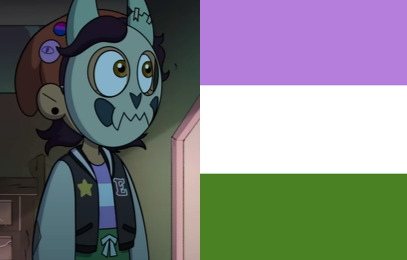
[ID identical to alt: a screenshot of Luz in a t-shirt with purple and white stripes, along with green sweatpants. It evokes the genderqueer flag, which is displayed next to her. End description.]
in the narrative, queerness is taken so in stride that Luz never even seems surprised by how normalized it is in the Boiling Isles — and from the start, she isn't afraid to show her own bisexuality either, which I think speaks volumes to how Camila must've raised her in a very accepting environment. but still, there's something to be said about how special it must be for Luz to meet the Titan —
who is King's dad, who is the source of all her magic, who the literal ground she's been walking upon —
and for Luz to realize: "oh, him? the closest thing to a deity of this world? she's actually a lot like me."
#the owl house#luz noceda#papa titan#the owl house meta#toh meta#folks i rewatched the finale the other day and i am NOT normal about it#the entirety of luz and the titan's relationship just makes me want to lie on the floor bawling (/positive)
784 notes
·
View notes